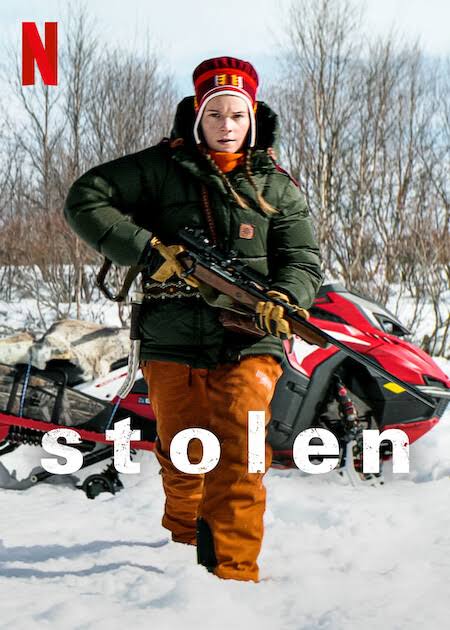Stolen (2024) Netflix movie review: A powerful Swedish-Sámi drama about identity, resistance, and Indigenous survival. Read our full review of Elle Márjá Eira’s poignant directorial debut.

Stolen (2024) – Movie Review
BMR Rating: ⭐ 8.2/10
Genre: Drama / Social Thriller
Language: Sámi, Swedish
Director: Elle Márjá Eira
Starring: Elin Kristina Oskal, Martin Wallström
Platform: Netflix
Release Date: April 12, 2024
Runtime: 107 minutes
Country: Sweden
🧊 Introduction
Stolen (Swedish: Stöld) is a poignant and powerful Swedish drama directed by Elle Márjá Eira in her feature directorial debut. Based on the acclaimed 2021 novel by Ann-Helén Laestadius, the film tells the story of a young Sámi girl fighting against racism, marginalization, and the slow erasure of her Indigenous identity. Released globally by Netflix, the film offers both a deeply personal coming-of-age narrative and a chilling portrayal of environmental injustice and cultural silencing.
Through raw storytelling, stark cinematography, and emotionally resonant performances, Stolen becomes more than just a film—it’s a cinematic call for empathy, awareness, and resistance.
⸻
🌨️ Plot Summary
The story follows Elsa (Elin Kristina Oskal), a young girl from the Sámi Indigenous community in northern Sweden, whose family practices traditional reindeer herding, a way of life increasingly under threat. At the age of nine, Elsa witnesses the brutal killing of her beloved reindeer by a local man driven by hatred and prejudice. Though Elsa reports the crime, it is dismissed by authorities—a pattern that repeats throughout the film.
As Elsa grows into a teenager and later a young adult, she continues to fight for her right to protect her community’s land and way of life. The tension escalates as threats, violence, and systemic apathy surround her. Meanwhile, Elsa begins to discover her voice as a writer and activist, confronting not only external threats but also the emotional toll of generational trauma and the silent complicity of society.
⸻
🎭 Performances
Elin Kristina Oskal, in the role of Elsa, delivers a raw, heartfelt performance. A real-life Sámi actress, her portrayal is grounded in authenticity. She captures the vulnerability, quiet rage, and fierce determination of a girl who refuses to remain silent. Her transformation from a frightened child to a courageous young woman is both moving and inspiring.
Martin Wallström (known for Mr. Robot) plays a conflicted local police officer. His performance adds nuance, portraying the complexity of a man caught between his duty and the ingrained prejudice of the society he serves.
The supporting cast, largely made up of Sámi actors, lends cultural authenticity and emotional depth, grounding the film in real-world experiences.
⸻
🎬 Direction & Screenplay
Director Elle Márjá Eira, herself Sámi, brings an insider’s sensitivity to the narrative. Her vision is both poetic and powerful, capturing the quiet pain and strength of Indigenous life. Eira avoids heavy-handed messaging; instead, she lets the landscape, the silences, and the characters speak volumes.
The screenplay by Peter Birro effectively adapts the source material. It balances the intimate moments of Elsa’s personal journey with the broader political commentary on institutional neglect, land rights, and cultural survival. The dialogue is sparse but impactful, allowing the weight of events to sink in naturally.
⸻
🎥 Cinematography & Visuals
Ken Are Bongo’s cinematography is breathtaking. Sweeping shots of snow-covered landscapes juxtapose with haunting images of butchered reindeer, making the tension between beauty and brutality palpable.
The film uses natural light and long takes to emphasize Elsa’s isolation and the expanse of the land her people have inhabited for centuries. Each frame feels deliberate, inviting the audience to witness not just a story, but a reality often ignored.
⸻
🎵 Music & Sound
Lasse Enersen’s score is minimalistic and atmospheric, allowing ambient sounds—like wind, animal bells, and cracking snow—to heighten the realism. The music rarely intrudes, instead subtly supporting the emotional undercurrent of the scenes. Traditional Sámi joik singing is also used sparingly and effectively, adding cultural depth to key moments.
⸻
🧠 Themes & Subtext
At its core, Stolen is about invisibility and erasure. Elsa’s repeated pleas to authorities, and their failure to act, mirror the real-world struggles of Indigenous communities across the globe. The film critiques not just overt racism but also the apathy of systems designed to ignore the voices of the marginalized.
Themes of cultural survival, generational trauma, and resilience run throughout. Elsa represents a new generation—one that refuses to be silenced. The use of writing and storytelling as her weapon against injustice adds a powerful meta-commentary on the role of art and voice in resistance movements.
⸻
✅ Verdict
Stolen (2024) is a haunting, visually stunning, and emotionally potent film that sheds light on an often-overlooked Indigenous community. It’s more than a drama—it’s an act of cinematic resistance, told with grace and authenticity.
While the film’s slow pace and restrained narrative may not appeal to every viewer, those who appreciate meaningful cinema rooted in real-world issues will find Stolen to be a deeply affecting experience.
Elle Márjá Eira’s debut is a triumph, and Elin Kristina Oskal’s performance is unforgettable. For those willing to listen, Stolen speaks loudly and clearly about justice, memory, and the power of standing up.
⸻
📝 Meta Description (SEO):
Stolen (2024) Netflix movie review: A powerful Swedish-Sámi drama about identity, resistance, and Indigenous survival. Read our full 800-word review of Elle Márjá Eira’s poignant directorial debut.
⸻
BMR Rating: ⭐ 8.2/10